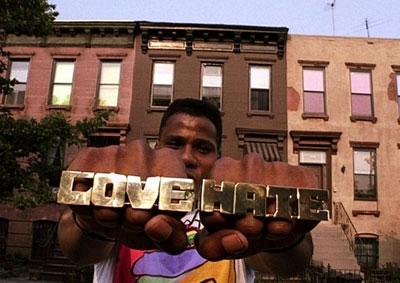Directed by Spike Lee
Writer-director-actor Spike Lee’s third feature, a lively, frequently hilarious but hard-hitting drama, charts mounting racial tensions on the hottest day of the year in the Bedford-Stuyvesant neighborhood of central Brooklyn. Released in the wake of a series of violent incidents—including the high-profile police killings of graffiti artist Michael Stewart in 1983 and Eleanor Bumpurs in 1984— the film is a passionate and engrossing state of the union.
Sometimes mischaracterized as a call to arms, the film’s equal-opportunity validations and critiques, its polyphonic approach to Black identity and its ambiguous “message” (focusing on the only known photograph of pacifist Martin Luther King and militant Malcolm X together) testify to its complexity. The movie offers descriptions rather than solutions; its very title denies easy explication.
The action takes place in and around an Italian pizzeria owned by Sal (Danny Aiello), whose equivocal attitude toward his Black customers is reflected by his two sons, the racist Pino (John Turturro) and affable Vito (Richard Edson). Mookie (Lee) is Sal’s deliveryman, who navigates the neighborhood with casual aplomb, connecting a host of colorful characters, including the irascible Buggin’ Out (Giancarlo Esposito), the towering Radio Raheem (Bill Nunn), and various youth, elders, commentators, and passersby.
Resolutely contemporary in feeling, the film makes fascinating connections to history. Established actors Ossie Davis and Ruby Dee appear alongside newcomers Martin Lawrence, Robin Harris, and Rosie Perez. A nostalgic blend of jazz and R&B mixes with aggressive hip-hop, notably Public Enemy’s rap anthem, “Fight the Power.” A reconfiguration of Robert Mitchum’s “love/hate” monologue from The Night of the Hunter and cinematographer Ernest Dickerson’s many canted angles and blinds-striped, sunlit rooms evokes an aesthetic of MTV-noir.
Coming at a time when white filmmakers such as Steven Spielberg (The Color Purple) and Alan Parker (Mississippi Burning) were making highly touted Black “message pictures” (and before studio subsidiaries became prevalent), Lee’s rousing and provocative movie announced the presence of a new voice willing, able and demanding to speak for itself.
—Doug Cummings
40 Acres and a Mule Filmworks. Producer/Screenwriter: Spike Lee. Cinematographer: Ernest Dickerson. Editor: Barry Alexander Brown. Cast: Ossie Davis, Ruby Dee, Spike Lee, Danny Aiello, Roger Guenveur Smith, Richard Edson.
35mm, color, 120 min.






 Mobile Navigation
Mobile Navigation

